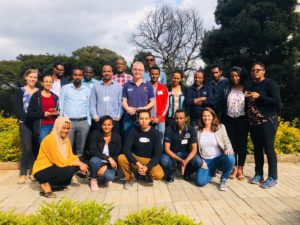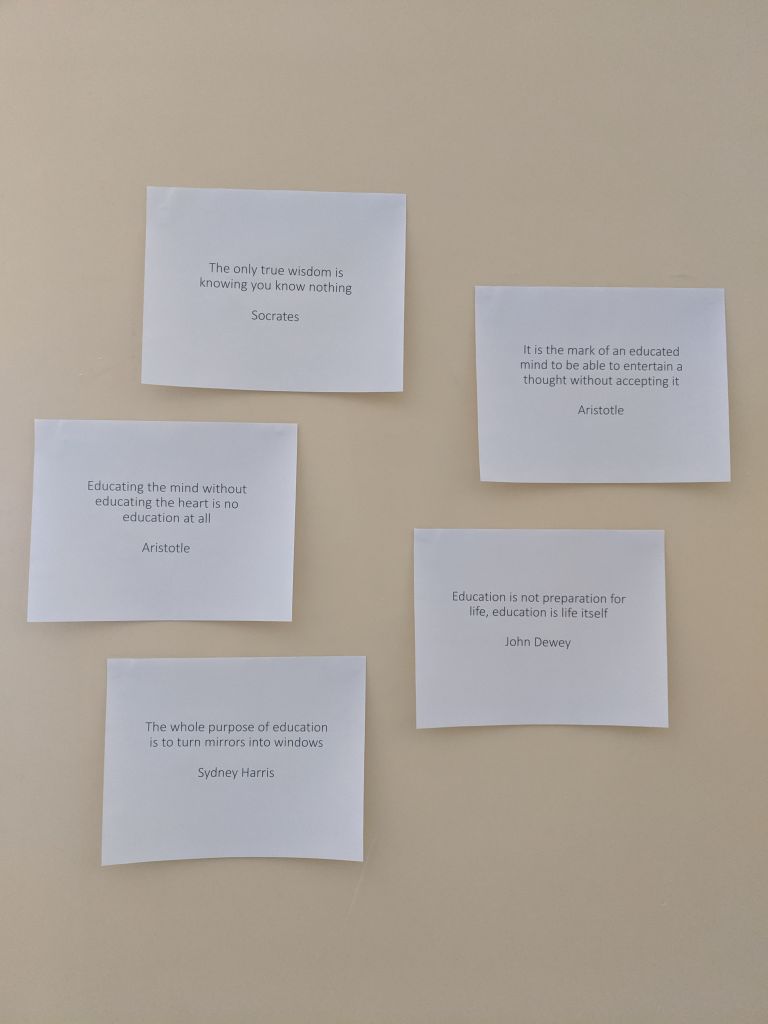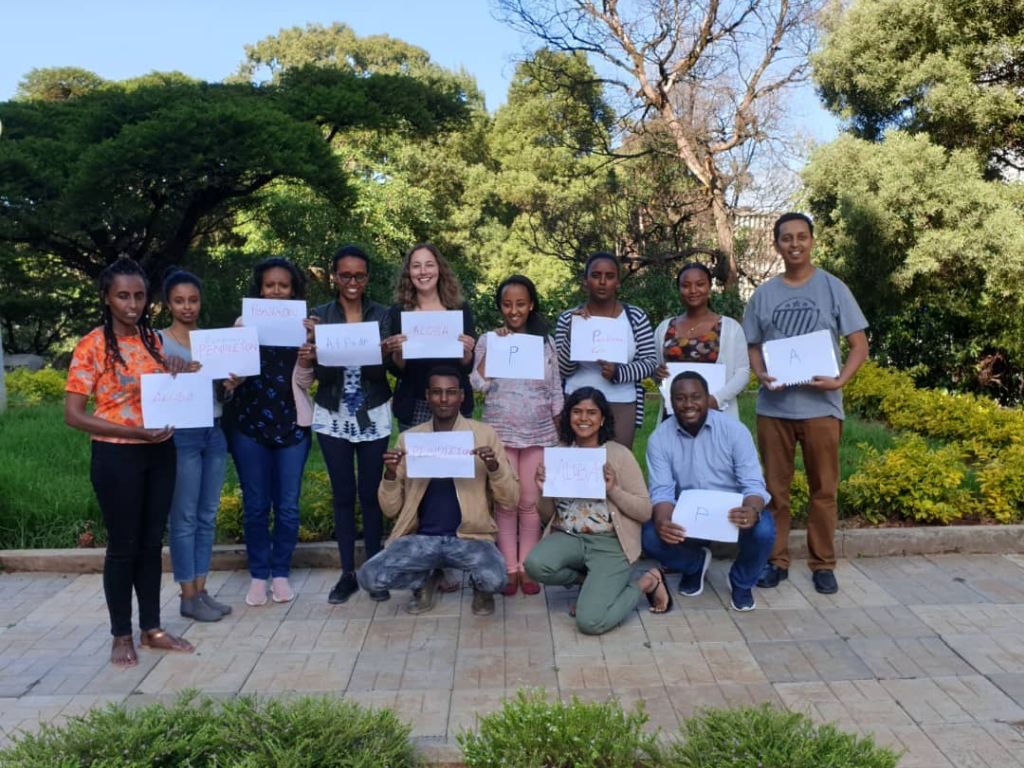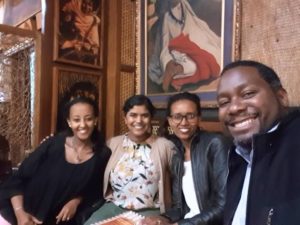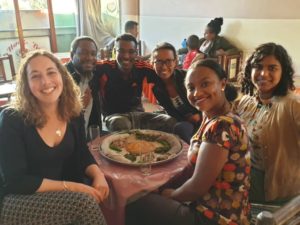Updating the Inspire Leadership Course
On June 9, 2020When Lisa and I started working on leadership training together, it was all based in Zambia. We both know the Zambian context quite well, having spent a lot of time there, and were fairly familiar with the culture, and in particular the medical culture. In 2017, we took the same material to Kigali in Rwanda, where I was living at the time. I thought that on the whole, it worked really well, and that the course was very much appreciated. We did notice that there were some big cultural differences between Zambia and Rwanda though, they are very different places, and this really affected how some of the workshops were received. Issues such as the steepness of medical hierarchy and the culture of how healthcare professionals engage with patients meant that some of our prepared exercises just didn’t translate as well as we had wanted them to. When we started working towards running the Inspire Leadership course in Addis Ababa, Ethiopia (where www.casief.ca has a long standing partnership with Addis Ababa University) we wanted to think of ways that we could make this course more relevant to diverse contexts. We also wanted to make sure we didn’t shy away from nuanced and controversial issues such as the tensions between physician and non-physician anesthesia providers, and how to manage conflict in authoritarian contexts.
Firstly, I think that the reason that the material that we developed in Zambia already worked quite well in Rwanda was the way that the course is designed and structured. As is the case with the other Inspire courses, we prioritize having the right people in the room, including working with local faculty, but also having multidisciplinary participants. The second thing is that the course is designed to include participants spending a lot of time reflecting on their own leadership experiences, guided by expert faculty and structured exercises. As is the case often in life, there are no “right answers” and most of the answers we come up with in the course come from the participants themselves. Still, we wanted to make sure that the course was evolving and responsive. One thing that we did was look at similar leadership training by other groups, including the Emergency Medicine group working with the TAAAC program in Addis, an Australian anesthesia group (Chris Bowden and colleagues) who have been working on leadership training in the Pacific and also (more recently) the Royal College of Surgeons of Ireland who have long been working with COSECSA.
The main thing that we did differently this time, which I thought worked really well, was to have a 2-day leadership conference before our leadership course. The idea was that these two days would be primarily round-table discussions and would focus on controversies. Unlike the Inspire course, we had this conference focus just on leadership in anesthesia. We invited some fantastic faculty from the region to come and speak.
- Stephen Ttendo was one of the first anesthesiologists to be trained in Uganda. It’s hard to understate the impact that Stephen’s leadership has had on the development of anesthesia as a specialty in Uganda, which I think that most people feel is well ahead of most of it’s neighbors, or the respect that he has in his country. Stephen is a naturally effective leader, who has a knack for putting the right people in the right positions, delegating well, and empowering others. I’d heard him speak before when I’d invited him to the Bethune Round Table conference in Ottawa in 2017 and I was sure that his perspective would add value to colleagues in Ethiopia, where anesthesia is at a really interesting inflection point with huge investment in scaling up training.
- I’ve known Prof Theogene Twagirumugabe since around 2015. He was previously the Chair of the Department of Anesthesiology, Critical Care and Emergency Medicine at the University of Rwanda, and the Head of Department of Anesthesiology in Butare. When he returned to Rwanda after training in France, he was only the second anesthesiologist in the whole country, joining Dr Jeanne D’Arc Uwambazimana, who herself was the only physician anesthesiologist left in the country after the 1994 genocide. During his tenure as chair, he presided over a remarkable development in anesthesia in Rwanda. Where there had previously been no capacity for training in-country, there is now a thriving residency program (40 residents) and also non-physician anesthesia provider training. Theogene is also an amazing speaker, and his quiet but assured leadership style has enabled a focus on quality while scaling up anesthesia capacity.
- I’ve known Naomi Shamambo since the start of her training in anesthesia in 2011 at the University of Zambia. She was in the first cohort of anesthesiologists training in Zambia (ever!) and since graduation has developed into a strong and vocal advocate for patient care in anesthesia and critical care. It’s a particular challenge having leadership thrust upon you so early in your career, while anesthesia as a specialty seems decades behind other specialties such as surgery and obstetrics with their professorial units and long established residency programs. Naomi has also taken a 1-month leadership fellowship in the UK with GADP, and since then has been running some leadership training of her own with colleagues is Zambia. She’s also done a lot of teaching with our sister-course, Inspire Through Clinical Teaching.
- Mark Gacii runs the WFSA pediatric anesthesia fellowship in Nairobi, where he is a staff anesthesiologist and faculty at the University of Nairobi. In that role he’s been instrumental in rolling out the Inspire Teaching course in Nairobi, which has become a really successful hub for that course. Kenya is way ahead of much of East Africa in terms of healthcare and especially anesthesia and I was sure his perspective would be valuable for our Ethiopian participants.
- Rediet Shimeles Workneh also agreed to come as an Ethiopian guest speaker. I had previously invited her to come and speak at the Canadian Anesthesiologists Society Annual Meeting in Montreal in 2018, and she’s a great speaker, with a passionate vision for improving perioperative care in Ethiopia and is also a very kind and wonderful person!
Of course Lisa Kelly adds a huge amount of her own expertise. I realize I’m very lucky to be able to borrow some of her valuable time from Nottingham University Hospitals NHS Trust, where she is the Chief Operating Officer, for a trust with around 16,000 staff. She is one of the youngest COOs in the NHS, and Lisa spent a year with our ZADP program in Lusaka, supporting leadership and management development there.
I knew I had a “dream team” and reflecting back, I think that having a short leadership conference before rolling out the Inspire course is quite essential. It let us hear from people in Addis before we gave them material to work with. It got right to some of the thorniest and most political issues that challenge leaders in healthcare in East Africa. It really meant that Lisa, myself and the rest of the team who also stayed on for the Inspire course were keyed in to the local context. We will plan the same thing for future courses in Guyana, Uganda (with Stephen Ttendo as an enthusiastic local champion) and hopefully, funding permitting, in Nairobi with Mark Gacii before too long.
Inspire Leadership in Uganda
We were lucky to have Dr Stephen Ttendo as faculty on our Inspire Through Clinical Leadership course in Addis Ababa. Stephen added huge value as faculty, with his wealth of experience leading change in perioperative care in Uganda, and he also got fired up about the possibility of running similar training in Uganda, where he felt there was a lack of opportunities for this kind of training. We worked together, also including Dr Chris Bowden from Melbourne, Australia, to apply for a World Federation of Societies of Anaethesiologist’s (WFSA) grant. I’m delighted to report that the WFSA awarded us $10,000 USD to support both a leadership conference and an Inspire Leadership course in Kampala in 2020. Our initial goal was to have this training in October 2020, but due to the COVID-19 pandemic and current travel restrictions delays are likely. I’ll keep you posted here as things develop.
Inspire Through Clinical Leadership in Addis Ababa
Many thanks to our partners at Addis Ababa University and Black Lion Hospital for hosting us for our first Ethiopian Inspire Through Clinical Leadership course in Addis Ababa, December 2019. A highlight of the course for me was the session on Conflict Management. Ethiopian culture tends to be avoidant of open conflict, but of course that doesn’t mean that conflict doesn’t happen, or that failure to resolve it doesn’t result in poor team performance and patient outcomes. I was struck by how course participants created a safe space to really speak very honestly about some of their own experiences, with often emotional and sometimes highly humorous accounts of becoming embroiled in conflict at work, and either resolving, or failing to resolve those conflicts. It seemed very clear that for a country like Ethiopia, that is trying hard to scale up perioperative services to meet an overwhelming burden of surgical disease, entrenched rivalries between different professional groups can cause real harm. There were impassioned pleas for resolving conflicts between physician and non-physician groups working and task-sharing in different areas.
Another highlight was the session on Leading Change. Despite myriad cultural and contextual differences, it’s great to see participants really getting to grips with structured tools like Kotter’s change management model and working through applying it to actual examples. Input from Dr Ttendo’s experiences in Rwanda and Prof Twagirumugabe’s experiences in Rwanda resulted in a great discussion.
Dylan Bould
Inspire Through Clinical Teaching – Uganda January 2020
On February 17, 2020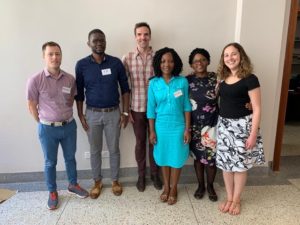
Course facilitators (from left to right): Dr. Frankie Powell (USA), Dr. John Paul Ochieng (Uganda), Dr. Dean Nolte (South Africa), Dr. Christine Namata (Uganda), Dr. Naomi Shamambo (Zambia), Dr. Sonia Akrimi (UK)
The Inspire Through Clinical Teaching course was held for the second time in Uganda this past January at the New Mulago Specialised Women and Neonatal Hospital in Kampala. The course facilitators included several who were present at the inaugural Ugandan Inspire course in January 2019: Dr. John Paul Ochieng (Anaesthesiologist, Uganda), Dr. Christine Namata (Anaesthesiologist, Uganda), Dr. Dean Nolte (Anaesthesiologist, South Africa), and Dr. Frankie Powell (Anaesthesiologist, USA). They were joined by Dr. Sonia Akrimi (Anaesthesiologist, UK) and Dr. Naomi Shamambo (Anaesthesiologist, Zambia), who are certainly no strangers to Inspire themselves. Dr. Ochieng served as the course director and did a fantastic job organizing everything and making sure everything was in order for the course.
Prior to welcoming our participants, we held a Training of Trainers session for the facilitators in which we honed our own skills in lesson planning, teaching, and feedback. The following day, we were met by an enthusiastic group of participants made up of registrars, nurses, and a pharmacist. Throughout the course, the group were very engaged and actively participated in all aspect.
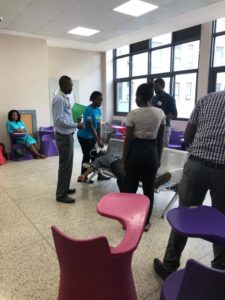
Participants carrying out a simulation
In particular, this group were defined by their adaptability. We unexpectedly had to switch to a new classroom partway through the course, but the participants didn’t bat an eye and carried on just as strong. Also, when we were not able to utilize the simulation lab, they helped us turn our classroom into our own lab, and they created and ran some excellent simulation scenarios.
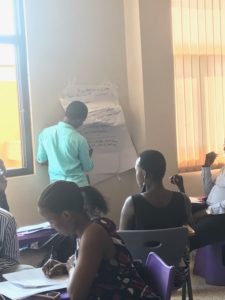
Participants planning a small group presentation
Finally, at the end of a successful course, eleven participants were awarded certificates of completion after we heard their large and small group presentations.
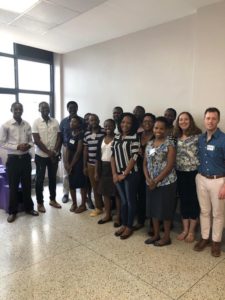
Participants and facilitators after the certificate ceremony
I would like to thank several people for making this Inspire course a truly excellent experience. First, to our course director, Dr. Ochieng, for his strong work and dedication. Also, to my fellow facilitators for being an energetic group who were easy to work with and who helped me grow as an educator. Next, thank you to the Association of Anesthestiologists of Uganda and the New Mulago Specialised Women and Neonatal Hospital for hosting us and providing us with the space to hold the course. And of course, a very big thank you to our participants for their hard work and their willingness to expand their skills as clinical educators.
Introducing our Guyanese Faculty!
On February 9, 2020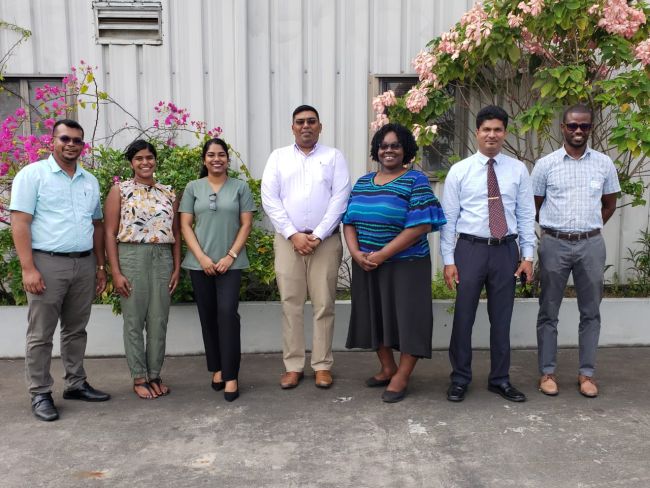
Dr. Dev Persaud, Dr. Purnima Rao, Dr. Diana Singh, D. Ravi Motilall, Dr. Aneisha Moore-Thorne, Dr. Navin Rambaran, Dr. Esan Reid
In 2018, Inspire Through Clinical Teaching was invited to the Georgetown Public Hospital Corporation by Dr. Alex Harvey and the Institute of Health Sciences Education to hold our first ever teaching course in Guyana.
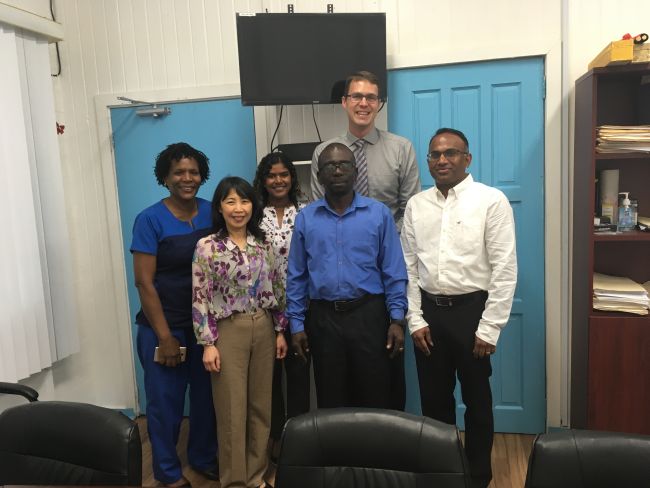
Four Canadian faculty from Ottawa, Niagara, and Hamilton taught an interprofessional, interdisciplinary group of thirty-two consultants, senior registrars, residents and nurses. We had some amazing conversations about the challenges and opportunities of teaching, mentoring, and growing the next generation of Guyanese clinicians. I remember being almost brought to tears by some of the comments made during our certification ceremony.
In 2019 we were lucky to recruit three of our course participants as co-faculty along with Dr. Rao and Dr. Rastogi from Ottawa.
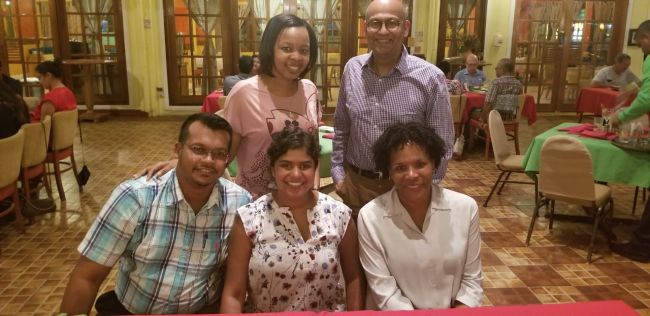
And here we are having just completed our third course in January 2020 with a fully trained local Guyanese faculty: Dr. Aneisha Moore-Thorne (Family Medicine), Dr. Ravi Motilall (General Surgery), Dr. Dev Persaud (Internal Medicine), Dr. Navin Rambaran (General Surgery), Dr. Esan Reid (Emergency Medicine), Dr. Winsome Scott (Pediatrics), and Dr. Diana Singh (Pediatrics).
I am so thankful for this team and all their hard work and dedication! They’ve attended our Inspire Faculty Development Days, they’ve spent hours of their own time (and even vacation!) preparing for and teaching the course, they’ve delivered content, organized logistics, given participants, each other, and me very insightful feedback, and have started some important discussions on how to make this course sustainable in Guyana. I am so excited to continue working with them and can’t wait to see what they do next.
Thank you again for a wonderful week!
Inspire Kenya 3!
On December 4, 2019This Tue 3rd of December, 2019 we have our third Inspire Through Clinical Teaching Course at the Kenyatta National Hospital, Nairobi, Kenya. This has been made possible through a grant. The previous courses were successful and we have been able to recruit local faculty. Dr. Naomi Shamambo, an anaesthesiologist at the University Teaching Hospital, Lusaka, Zambia shall be joining us. She is on the Inspire steering committee and leads the courses in Zambia independently.
Dr. Mark Gacii who runs the WFSA Paediatric Anaesthesia Fellowship shall be part of the faculty. He attended the Inspire course in Addis in May this year. He has been instrumental in ensuring that we continue to have the Inspire courses in Nairobi.
We have a diverse local faculty from different universities in the country who act as Inspire course ambassadors. Participants have been doctors in various fields and we believe this will have a great impact on improving quality of training and developing a network of medical educators.
Thanks to the Kenya Society of Anaesthesiologists and to the University of Nairobi, Anaesthesia Department for the great support through the courses. The Anaesthesia Department at the Kenyatta National Hospital has provided the training venue each time.
Dr. Victoria Simiyu
Inspire Through Quality Improvement
On June 10, 2019The QI Community has certainly had an eventful week! We were invited to present about our community in the QI Zambia Conference, hosted by the Ministry of Health in the Intercontinental hotel in Lusaka. The Conference has been a humbling experience, hearing so many fantastic presentations about local health care professionals driving forward change throughout Zambia. However, it was clear from some of the presentations there is a lack of knowledge about where to start with QI and how to structure a project.
Our presentation was well received and delegates were really enthused to join our Facebook community. Our Facebook community now has 13 participants (have to start somewhere!), but after we hope that his will grow after we have started our series of Masterclasses. The Masterclass series has been developed in consultation with a Technical Working Group of 26 key stakeholders, including national leads for 4 specialities and backing from the Zambian Ministry of Health.
This Saturday we will start our first masterclass cycle. We will start with a ‘train the trainers’ day for faculty followed by the first two participant sessions next week. Participants have provided us with their project proposals prior to the course and we’re really excited to see how they develop over the 4 weeks. We have a large variety of projects and the participants really show motivation to learn skills to drive change. We’ll keep you updated with the progress of our first pilot Masterclass course and we will share with you the fantastic work being undertaken here in Zambia.
Sarah El-Sheikha, Zambia Anaesthesia Development Project Fellow
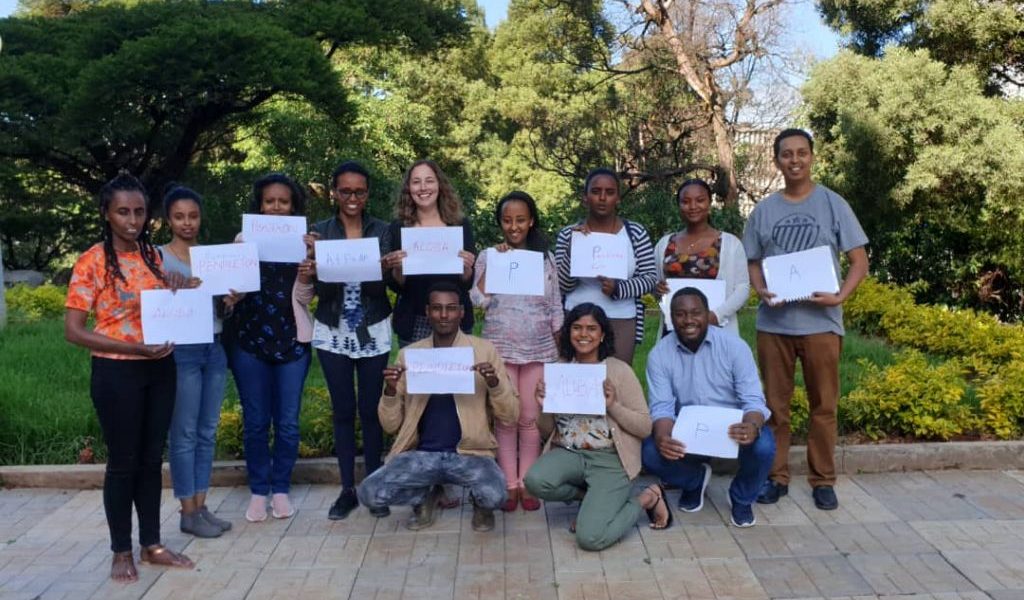
Faculty Development Day
On June 2, 2019One of our goals during Inspire Through Clinical Teaching is to identify course participants with a passion for medical education and teaching and mentor them as faculty for future courses.
Why do we need local faculty?
- Because local faculty understand the challenges of teaching in their specific clinical and classroom environment.
- Because local faculty will help ensure this course continues in a sustainable way.
- Because local ownership and embedding Inspire Through Clinical Teaching within existing curricula is one of our main goals.
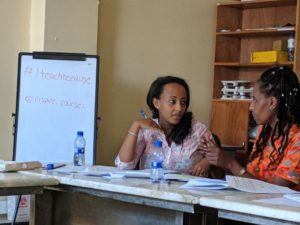 This weekend in Addis Ababa we held our third ever Faculty Development day. Ten anesthesiologists and anesthesia providers who took part in our first Ethiopian Inspire Through Clinical Teaching course joined us to reflect on what teaching means to them #iteachbecause, discuss the role of formative assessment in helping learners develop as clinicians, and practice using different models of giving feedback. In case you’re wondering, Pendleton’s Rules won by a landslide as their favourite way of giving feedback.
This weekend in Addis Ababa we held our third ever Faculty Development day. Ten anesthesiologists and anesthesia providers who took part in our first Ethiopian Inspire Through Clinical Teaching course joined us to reflect on what teaching means to them #iteachbecause, discuss the role of formative assessment in helping learners develop as clinicians, and practice using different models of giving feedback. In case you’re wondering, Pendleton’s Rules won by a landslide as their favourite way of giving feedback.
Faculty Development Day also gives participants a chance to practice delivering different parts of the course, which was especially useful because during the following week Dr Rediet Shimeles and Dr Mahder Barahi (Black Lion Hospital, Addis Ababa University) joined us as co-facilitators for Inspire Ethiopia 2. They both delivered excellent workshops on Teaching in the Clinical Environment and Large Group Teaching. I’m excited to see where these two strong leaders and educators take Inspire Through Clinical Teaching in the future.
I want to thank CASIEF (https://casief.ca) for their funding and support in making the last two weeks happen. Thank you to Dr. Sonia Akrimi and Dr. Amon Ngongola for traveling all the way from the UK and Zambia. Thank you to the Black Lion Hospital and Addis Ababa for hosting us.
And finally, thank you for teaching me all about injera, shiro, and the right way to make coffee!
Preparing for Inspire in Addis
On May 14, 2019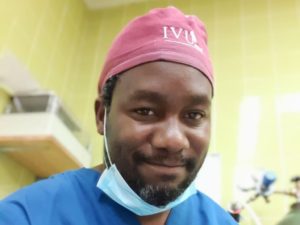 We are now less than a week from the start of our inaugural Inspire Through Clinical Teaching course in Addis Ababa University/Black Lion Hospital, Ethiopia. We will be running two courses back to back, with a faculty development day in between, funded by www.casief.ca. I think we have most things organized before next Tuesday’s start.
We are now less than a week from the start of our inaugural Inspire Through Clinical Teaching course in Addis Ababa University/Black Lion Hospital, Ethiopia. We will be running two courses back to back, with a faculty development day in between, funded by www.casief.ca. I think we have most things organized before next Tuesday’s start.
Many thanks to Dr Mahder Barahi and Dr Ananya Anate for hosting us in Addis. It’s really exciting to take the course to a new place and I find that the best part of teaching on the course is meeting new people. There’s been a lot of interest in Addis with participants lined up from several different institutions and multiple specialties/professions. I’m also excited to spend a little more time in Addis, CASIEF has been partnered with Addis Ababa University for some years now but I’ve only had the chance to visit once before just last year.
For me two of the key things about the Inspire course is local ownership, and developing a network of medical educators. I’m used to working with Dr Amon Ngongola (see picture) in the pediatric operating rooms at the University Teaching Hospital, Lusaka, Zambia – where he is a pediatric surgeon. Next week he’s travelling (pending visa) to Addis to be the course director for the Inspire course, having been involved in several courses in Lusaka. I’m also looking forward to seeing Dr Mark Gacii again, who is coming to Addis to take the course as a participant. I met Mark in Nairobi last year during another Inspire course, where he runs the WFSA Pediatric Anesthesia fellowship. No doubt potential future Ethiopian faculty will be recruited in the first course next week and will help to co-facilitate the next course, and there is always plenty to learn from course participants.
Finally really glad Dr Sonia Akrimi will be coming for the first course next week, and Dr Purnima Rao for the week after. They both have impressive medical education résumés and are both Inspire course authors. I think we have an ideal mix of medical educators with different levels of experience from diverse backgrounds. Watch this space for more details as the course runs – and I’ll try to post some pictures on the Instagram feed (link at bottom of the page) during the course if I get good enough internet in Addis.
— Dr. Dylan Bould
Welcome to www.inspirecourse.com
On April 25, 2019It’s an exciting time for Inspire Through Clinical Teaching. After 3 years, a dozen courses, 5 countries, and over 300 participants, Inspire has made it online!
This is a place where you can learn more about who we are and what we’re doing. It’s a place where we can share news, photos and updates. It’s a place where you can connect with people around the world who are interested in teaching and medical education. It’s a place where you can learn how to get involved.
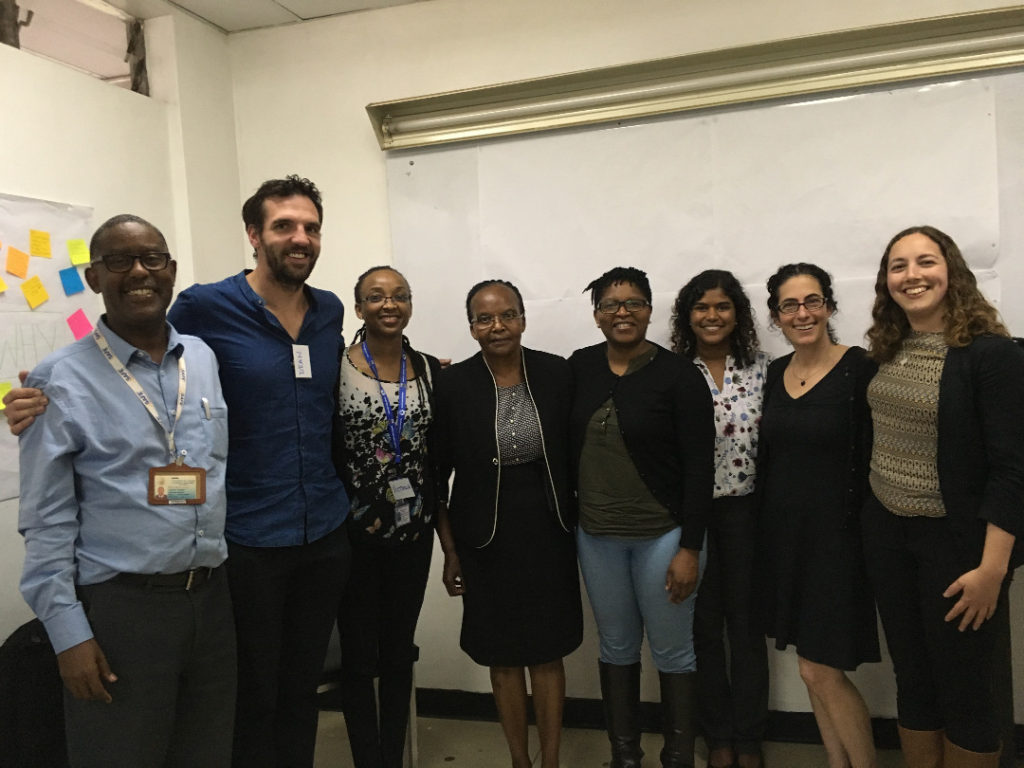
(L-R) Mark Gacii, University of Nairobi; Dean Nolte; Victoria Simiyu, University of Nairobi; Representative from Kenyatta National Hospital; Naomi Shamambo, University Teaching Hospital Lusaka, Zambia Lead for Inspire; Purnima Rao; Faye Evans, Boston Children’s Hospital, WFSA Education Committee Sonia Akrimi
None of this would have been possible without a lot of people’s time, hard work, creativity, support and encouragement. Thank you to our course creators, our course directors and facilitators, and our participants. We’ve learnt a lot from each other and had a lot of fun along the way. Thank you to the World Federation of Societies of Anaesthesiologists (WFSA) and the Society of Anaesthetists of Zambia (SAZ) for working with us to establish Inspire Through Clinical Teaching and to spread the word about our course. Thank you to the Global Anaesthesia Development Project (GADP), Tropical Health and Education Trust (THET), UKaid, Canadian Anesthesiologists’ Society International Education Foundation (CASIEF), Institute of Health Science Education (IHSE), and the WFSA for their financial support of Inspire Through Clinical Teaching courses. And thank you to you, our reader, for visiting our website and for your interest in Inspire.
Make sure you check out our “What’s Happening Now” section to stay up to date with where we are and where we’re headed. You can also follow us on (you can find links at the bottom of this page).
Join us in working towards better teaching and education in healthcare.


